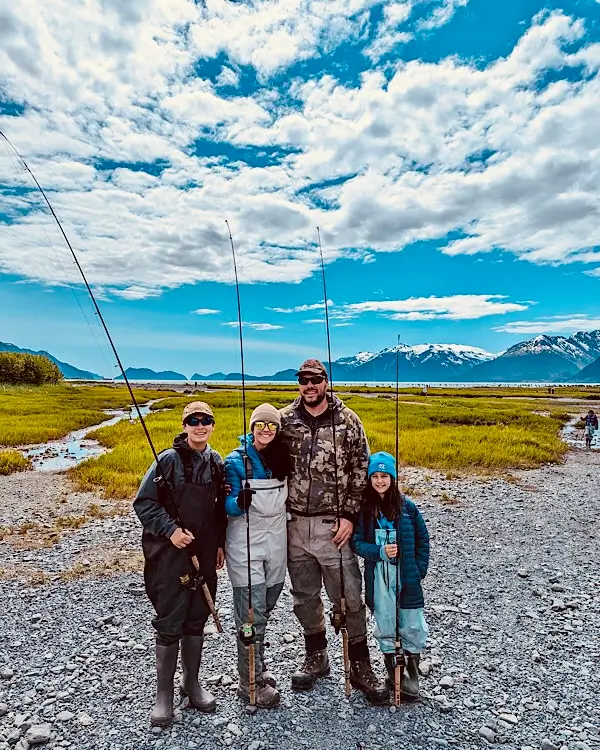Welcome to Alaska, the land of incredible wildlife and unforgettable landscapes. If you’re planning a trip to Alaska or have already arrived, you’ve probably heard about the astonishing bear sightings in the area.
As someone who’s lived in Alaska for years and has explored the wilderness solo and with groups, I’m here to share my tips and tricks for bear safety.
These tips are critical for your safety and the safety of the bears and their natural habitat. So strap on your hiking boots, grab a bear bell, and dive into the world of bear safety in Alaska.
Know your bears
Before venturing out in Alaska, it’s essential to understand the various types of bears and their habits. Alaska is home to both black bears and grizzly bears. Black bears are smaller and more skittish than grizzly bears, living on a primarily vegetarian diet.
Grizzly bears are more giant and aggressive, residing on vegetation and meat. It’s important to note that polar bears also roam the state but are mainly located in the northern parts near the Arctic Ocean.
Make noise
One of the easiest things you can do to avoid surprising a bear is to make noise. As you hike, wear a bear bell to let the bears know you’re coming. Talking loudly or singing also works, as bears usually avoid humans when they hear them coming. Avoid wearing headphones while hiking, as it will muffle any noise you make, making it easier to startle a bear.
Do dispose of your salmon in the fast flowing river
After you fillet a salmon, you must dispose of the remains. When disposing of your salmon remains, it’s crucial to do so in a fast-flowing river area. By doing so, you’ll ensure that the salmon remains are carried away from the campsite and that the smell is not as detectable for bears in the area.
If you don’t have a fast-flowing area nearby, you can always bury them at least 6-10 inches into the ground, away from the campsite.
Don’t dispose of your salmon remains near the campsite
This goes without saying, but avoid disposing of your salmon remains near the campsite, as bears can be attracted to the smell. This can result in potential attacks on humans and dangerous situations for campers and bears.
Remember that bears have an incredible sense of smell, and the last thing you want is to attract them to your vicinity.
Do use bear-proof containers for your fish remains
Bear-proof containers are a great way to store your salmon safely and protect them from bears. You can purchase bear-proof containers at camping stores or online.
As mentioned earlier, when using bear-proof containers, ensure they are adequately secured and disposed of in fast-flowing areas.
Don’t leave your salmon remains unattended
Leaving your fish unattended is a recipe for disaster, as it’s an open invitation for bears. Within a short time, bears can detect the smell and locate the source of the odor.
To avoid this, dispose of your salmon remains when you’re done fishing. Furthermore, never leave any fish remains in your car, tent, or any other enclosed space.
Do educated your group about proper disposal methods
It’s essential to educate your group about the proper disposal methods of salmon remains. Ensure everyone understands the importance of disposing of fish properly and the potentially fatal consequences of not following these rules.
Be mindful of where other groups are fishing in the area, as improper disposal can affect everyone’s safety.
Proper food storage
Bears have an incredible sense of smell and will pick up scents from miles away. If you’re heading out for a hike, store your food in bear-resistant containers or elevate them it in a tree at least ten feet off the ground, five feet away from the tree. Never leave food in your tent or eat in your tent, as the smell can draw a bear closer.
Bear encounters
Sometimes, no matter how much we prepare, we may come across a bear. If you encounter a bear, speaking calmly and remaining still is recommended. Avoid making direct eye contact and then slowly back away.
Never run away, as this can trigger a chase from the bear. If the bear charges at you, use bear spray (stored in an easy-to-access area) to deter the bear. In most cases, bear spray is more effective than a firearm and is much safer for both you and the bear.
Respect wildlife
Lastly, we must respect Alaska’s natural habitat and wildlife. It’s essential to keep a safe distance from the bears and not approach them. Please do not feed the bears, as this habituates them to humans and can lead to dangerous encounters in the future.
Please always take care of your trash and leftover food properly, making sure it’s clean in the area. By respecting the wildlife, we can ensure their safety and ours.
Alaska is a beautiful state that offers some of the most pristine wilderness in the world. However, it’s essential to recognize the risks of experiencing nature. By following these bear safety tips, you can have a fantastic and safe trip to Alaska.
Remember, we’re entering the bear’s home, and respecting their territory is essential. Keep your eyes peeled for bear signs, and always be prepared. Let’s keep Alaska’s bears and natural habitats thriving for generations.

